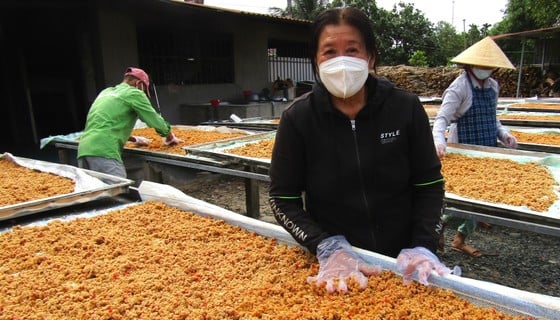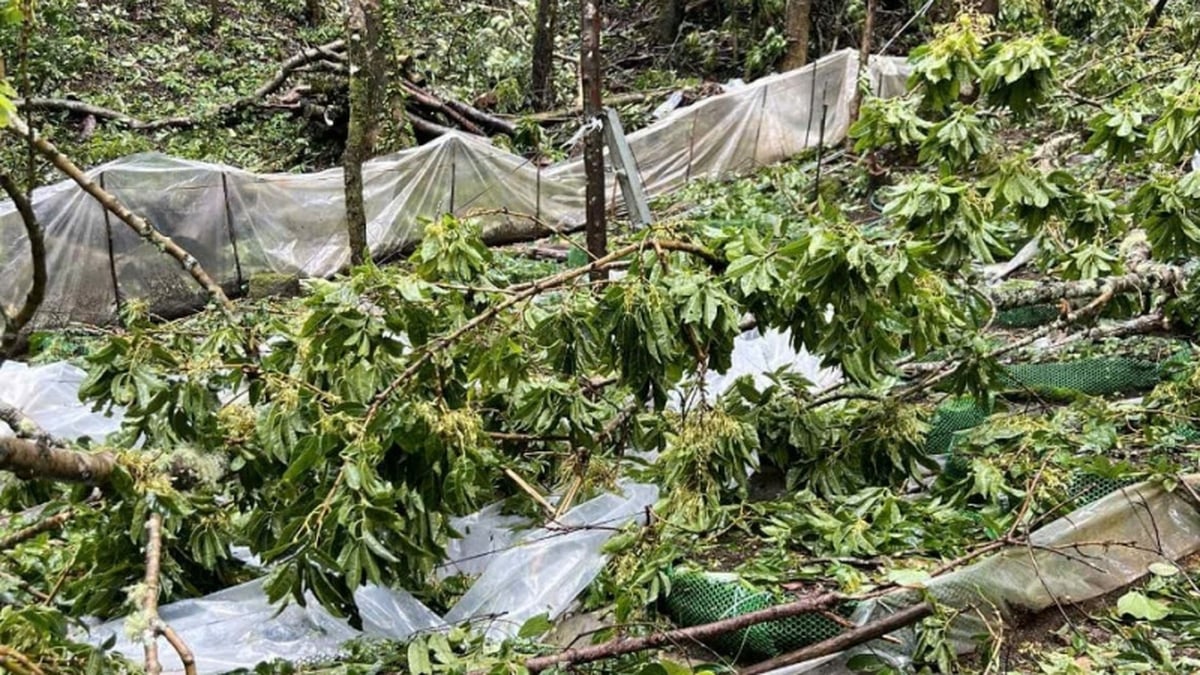SGGP
Tay Ninh province has no sea, and its shrimp and fish resources are also modest, but the people here have produced a unique type of shrimp and chili salt (also known as shrimp salt, chili salt) as a spice, which is loved by people everywhere. Recently, the Tay Ninh chili salt making profession has been recognized as a national intangible cultural heritage.
 |
| Ms. Le Thi My Van and workers mix shrimp salt in the drying yard. Photo: LE XUAN |
Handcrafted
The shrimp and chili salt industry is present in many areas of Tay Ninh province, but is mainly concentrated in Trang Bang and Hoa Thanh towns. From the center of Trang Bang town, following the small roads along Highway 22, it is easy to recognize the shrimp salt kilns by the smell of dried shrimp and chili and the salty taste of sea salt mixed in the air. Most of these production facilities are hidden in residential areas and all have spacious salt drying yards.
Coming to the production facility of Ms. Le Thi My Van (67 years old, Tan Loc quarter, Gia Loc ward, Trang Bang town), one of the traditional chili shrimp salt producers in Tay Ninh province, we witnessed a campus of more than 1,000m2 with a yard for drying salt, chili, a mixing area, grinding, packaging products... According to Ms. Van, the rare advantage of the Tay Ninh chili salt making profession is the hot weather with a long time during the day (about more than 6 hours), helping to dry the raw materials before mixing. The shrimp salt is produced entirely by hand, when kneading, the skilled person will feel each grain of salt, each piece of shrimp under their hands.
Ms. Van shared: “This job is quite hard and tiring because we have to mix salt in the hot sun for many hours. Only those who are diligent, love labor, and love salt as their source of life can “absorb” the mixing formula and can stand in the hot sun mixing handfuls of salt for hours, adding this flavor, subtracting that flavor to create a harmonious, flavorful shrimp salt product.”
On February 14, 2023, the Minister of Culture, Sports and Tourism signed Decision No. 230/QD-BVHTTDL on announcing the Tay Ninh chili salt making profession as a national intangible cultural heritage. This is the 8th national intangible cultural heritage of Tay Ninh province to be recognized.
It can be said that each jar of chili shrimp salt contains the spirit of labor, diligence and meticulous care of the product using traditional manual methods, which is both unique and carries the culture of the land and people of Tay Ninh.
Get rich from salt and shrimp
Not only consumed domestically, Tay Ninh chili shrimp salt is now exported to many countries, including the US market. With the wholesale price of the best salt at 200,000 VND/kg, each year it has brought in billions of VND in revenue for people working in Tay Ninh shrimp salt. According to production facilities, chili shrimp salt is not only used as a spice for daily meals, but is most delicious when used to dip fruits such as guava, apple, mango... quite rich and flavorful. Therefore, currently, chili shrimp salt products are sold very popularly in tourist spots, along major roads and have become one of the main products for tourists to buy as gifts every time they come to Tay Ninh.
Thanks to the income from chili shrimp salt, many households have improved their lives and even become rich, such as: Nhu Y salt processing facility (Ward 2, Tay Ninh City), Hai chili salt kiln (Long Hoa Ward, Hoa Thanh Town), or Do Thanh Thien vegetarian salt facility (Thuong Tan Ward, Hoa Thanh Town)... Mr. Vu Quang Nam (owner of Hai chili salt facility, Duong Minh Chau District) shared: "Although the shrimp salt profession is hard, if you persevere, you can get rich from this product. My family started making shrimp salt around 1996, I am the second generation to promote the family's traditional profession, currently the production facility has a scale of 6 salt kilns operating regularly, creating jobs for more than 20 local workers. Currently, each month the facility exports (through agents) about 600 kg of finished chili shrimp salt to Malaysia and the US, the remaining 80% of products are consumed at facilities processing mixed rice paper and rice paper. dew and tourist attractions in the province".
According to Mr. Vo Duc Trong, Permanent Vice Chairman of Tay Ninh Provincial People's Committee, the Department of Industry and Trade and the Department of Agriculture and Rural Development are currently studying the application of policy mechanisms to support establishments to promote commercialization, develop products in the direction of evaluation such as the One Commune One Product (OCOP) program to improve the quality of shrimp salt, ensure quality, design, and standards according to regulations, and then increase output. The province is also calculating funding from industrial promotion support sources, helping establishments to both preserve the "core" of the traditional profession and be able to improve the quality of products when selling to the market.
Source


































































































Comment (0)